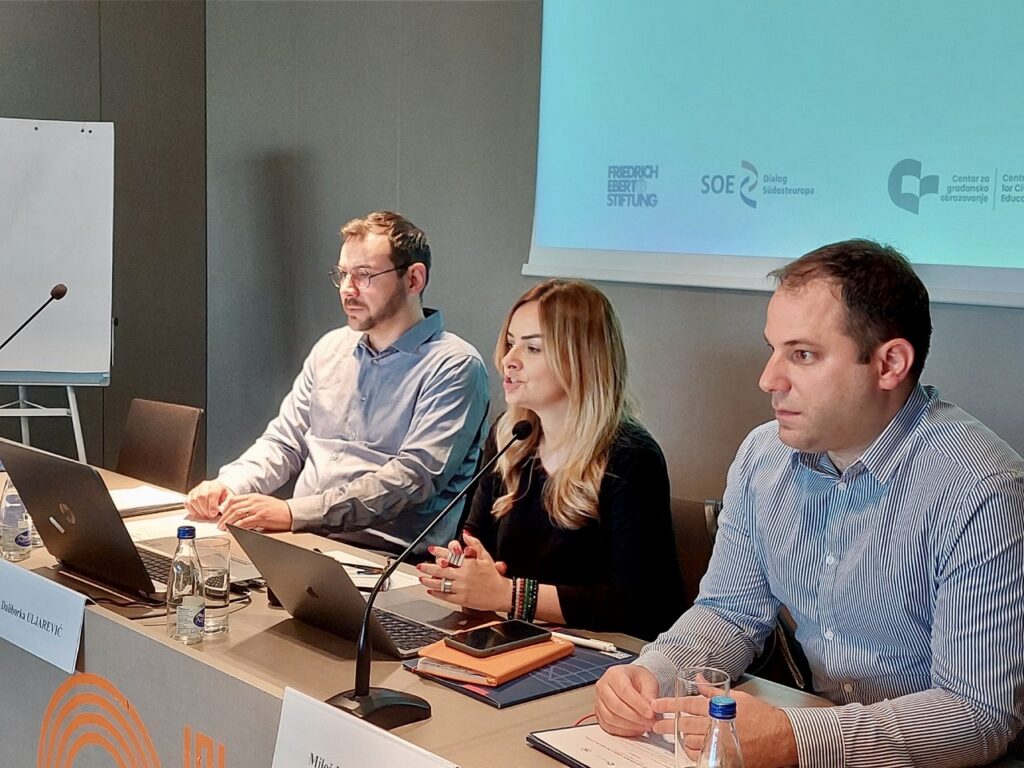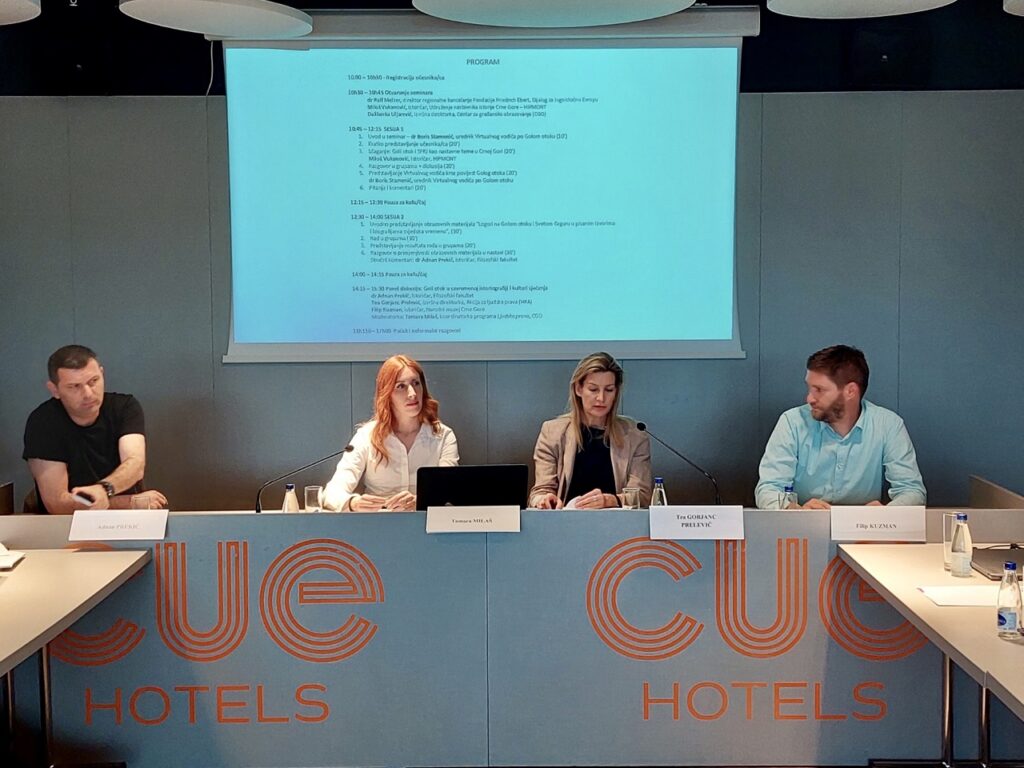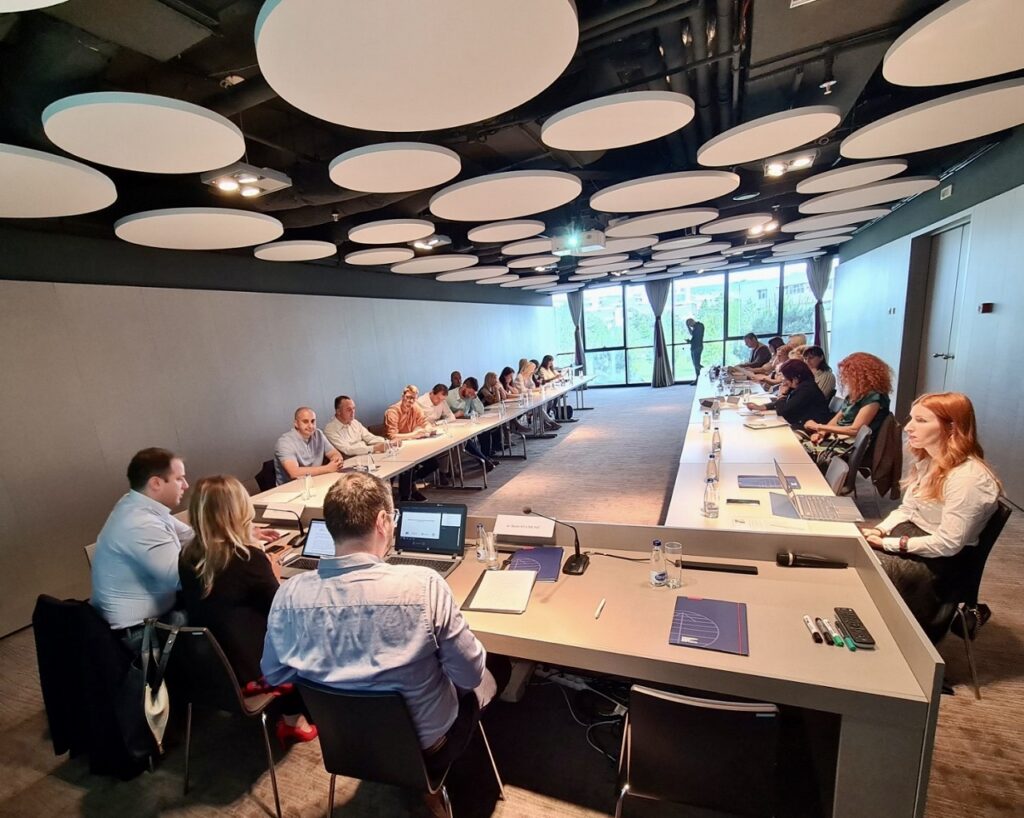Unpleasant questions from the past must be included in the educational system because their scientific and pedagogical treatment creates a basis for preventing human rights violations and repression, and gives an impetus for critical thinking, freedom of expression, attitudes towards otherness, and democratization, this was concluded today at a full-day seminar on Goli Otok organized for history teachers by the Centre for Civic Education (CCE), the Association of History Teachers of Montenegro-HIPMONT, and the Friedrich Ebert Stiftung (FES).
Dr Ralf Melzer, Director of the FES Regional Office for Southeast Europe in Sarajevo, opened the seminar and elaborated on the reasons for supporting this initiative. “You have a wonderful profession, but also a huge responsibility in transferring knowledge,” Melcer stated to the gathered history teachers.
“The Association of History Teachers of Montenegro has participated in several international projects dealing with sensitive topics. However, in this whole process, Goli Otok has been somewhat neglected as the focus has been on topics related to the events of the 90s. Although a certain number of materials have been created that contain sources and work methodology for the period of the SFRY (Socialist Federal Republic of Yugoslavia), today’s agenda we are talking, which includes Goli Otok and the SFRY as educational topics in Montenegro, represents a significant step forward that can be highly relevant for teachers in Montenegro,” said Miloš Vukanović, historian from HIPMONT.
During the seminar opening, Daliborka Uljarević, the Executive Director of the CCE, also reflected on CCE’s previous work in creating additional teaching materials for history classes and teaching controversial historical topics. She emphasized the significance of studying Goli Otok in Montenegro today. “Goli Otok serves as a reminder that authoritarian mechanisms of power cannot overcome internal differences and contradictions at a basic humanistic level, instead differences are erased through violence and terror. Goli Otok is also a reminder of how Russian imperialism exploits society’s internal weaknesses to destabilize the system and gain access to ‘warm seas’. Goli Otok is a reminder that pure repression and authoritarian mechanisms cannot solve long-term problems if there is no in-depth work with society, no change in the system, and this can only be done through essential democratization, which is particularly important to understand in relation to the ongoing processes in Montenegro,” Uljarević emphasized.
Dr Boris Stamenić, a Croatian historian and editor of the Virtual Guide to the History of the Camps on Goli Otok, presented this educational tool to the participants from Montenegro. “The Virtual Guide to the History of the Camps on Goli Otok provides a relatively simple and clear introduction to a complex historical topic. The virtual guide provides information to visitors of the site, but it can also be useful for teaching the topic in schools or non-formal education settings. The content of the guide is available in nine languages. Educational materials are available for download on the goli-otok.net website offering teachers and instructors various ways to use the virtual guide in lesson preparation and topic exploration. FES recognized the importance of addressing Goli Otok as a subject and provided financial support for the development of this guide, as well as its presentation activities in Montenegro and other countries,” he explained.
The seminar concluded with a panel discussion titled “Goli Otok in Contemporary Historiography and Remembrance Culture” with Dr Adnan Prekić, a historian from the Faculty of Philosophy, Tea Gorjanc Prelević, Executive Director of the Human Rights Action (HRA), and Filip Kuzman, a historian and director of the Historic Museum of Montenegro. The discussion was moderated by Tamara Milaš, Human Rights Programme Coordinator at the CCE.
“Topics like these, which are complex and contradictory, especially when they appear in the public discourse of our society, are always on the verge of being instrumentalized, and the story of Goli Otok is the best example. We need to separate two issues – on one hand, there are human destinies, and on the other hand, there is the historical context and the historical story of Goli Otok and the conflict between Yugoslavia and the USSR. Often, in addressing this topic, these two issues are equated, which, in my opinion, puts this topic on the brink of revisionism, and we must be very careful in that regard. It should be acknowledged that this was undeniably a form of crime committed by a totalitarian system, where people were imprisoned without judicial verdicts and held in inhumane conditions, with their human rights completely violated. However, we should not disregard the fact that the action against the fifth column was a completely legitimate stance of one government because if it were not for Goli Otok, the entire Yugoslavia would have become Goli Otok due to the danger posed by the USSR and everything that happened in 1948. This example shows that even when a totalitarian regime reacts appropriately, that action cannot be considered good, especially in terms of the implementation mechanisms and methods, which resulted in sending people to camps without any judicial proceedings or verdicts,” stated Prekić.
Gorjanc Prelević reminded that Human Rights Action (HRA) has submitted three initiatives to the executive authorities for the adoption of a law on the rehabilitation and compensation of victims of political persecution – prisoners of Goli Otok, Sveti Grgur, and other prisons. “The first time we submitted the initiative to Prime Minister Duško Marković in 2019, proposing that the Government urgently establish a working group to draft this law and include representatives of the Association “Goli Otok” and other representatives of the civil sector in the group. The second time we submitted the same initiative in 2021 to the General Secretariat of the Government, as one of the proposals for the Government’s Programme for 2021 (under Prime Minister Zdravko Krivokapić), but that proposal was not adopted either. The third initiative was sent in 2022 to the General Secretary of the Government (under Prime Minister Dritan Abazović) as one of the proposals for the Mid-Term Work Programme of the Government for 2022-2024, and for the Work Programme for 2022. All three initiatives faced the same fate – they were not adopted. Montenegro is the only country in the region that has not rehabilitated or compensated the victims of Goli Otok, and certainly, the reconstruction of the square dedicated to these victims is by no means a sufficient measure of reparation,” was clear Gorjanc Prelević.
“Our permanent exhibition was created in 1989, and although it was one of the most advanced museum exhibitions in Montenegro at that time, it became outdated over time and turned into a museum artefact. In its original form, it did not have anything dedicated to Goli Otok because the authorities at the time did not consider that topic important. The curatorial team decided that, for the commemoration of 1000 years of statehood and 10 years of renewed independence, a new exhibition should be created for the period from 1918 to 2006, and it included a section dedicated to Goli Otok. That was the first time that Goli Otok was mentioned in the National Museum. Later, we had a lecture by Jadranka Selhanović on this topic during the commemoration of 1948. Furthermore, during the commemoration of the 100 years of the Communist Party of Yugoslavia in 2019, as part of the exhibition ‘Flaming Dawns’, a section was dedicated to Goli Otok, with two segments – one dedicated solely to Goli Otok, which encompass a list of all the Goli Otok victims from the territory of Montenegro and another segment dedicated to Montenegrin communists, selecting 12 important communists through whose experiences we addressed the topic of Goli Otok. Finally, the museum hosted the exhibition „That justices are stronger than forces“ by Teodora Nikčević, whose work is based on practices of reflecting on personal histories and traumas of victims of contemporary camps, focusing on the experiences of Montenegrin Informbiro female detainees on the islands of Goli Otok and St. Grgur. As part of the exhibition opening, an oral history workshop was organized where female descendants of Goli Otok female detainees spoke about their ancestors and their lives before and after the camps. We plan to have a dedicated section on Goli Otok as part of the permanent exhibition, which would have multiple segments,” said Kuzman.
„First of all, I am grateful to the organizers for inviting me to participate. The topic is highly interesting and relevant. The sessions we went through today are fully applicable to the teaching process. Also, all praise the organization and the lecturers,” said Lazar Aranitović, a teacher at the Elementary School “Ristan Pavlović” in Pljevlja.
“The topic is current and extremely interesting for anyone dealing with history, and it is particularly important for Montenegro as we are all familiar with the victims who were imprisoned on Goli Otok. From an educational perspective, the biggest challenge in the Montenegrin educational system is that this topic is covered in the 9th grade of primary school and the 4th grade of high school, with insufficient class hours for thorough treatment. The materials and everything presented today can significantly help teachers in better addressing this topic. It is especially important to use this theme for scientific and not for daily political purposes, as we have witnessed in previous periods. Greater engagement from teachers is necessary because only with collective effort we can achieve better results in science and, consequently, in history,” emphasized Miloš Mrvaljević, a teacher at Elementary School “Vladimir Nazor” in Podgorica.
The seminar gathered around 30 participants who actively took part.
Vasilije Radulović, Programe associate



